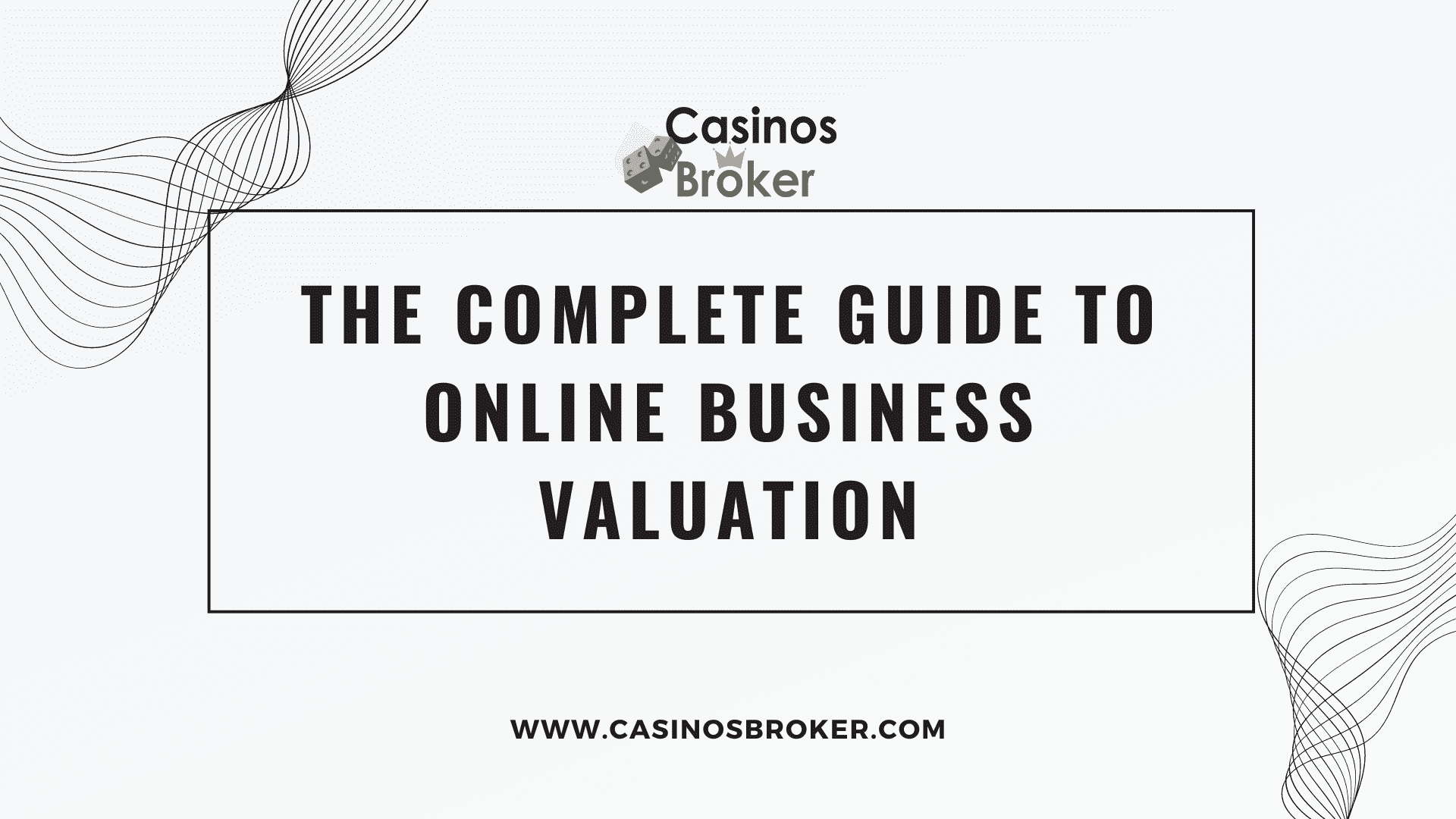The internet has birthed a vast and dynamic landscape of online businesses. From e-commerce stores and content-driven websites to SaaS platforms and subscription-based services, there’s a wealth of digital assets ripe for acquisition, investment, or sale. But before you can venture into the realm of online business transactions, there’s a fundamental question: How do you determine the true value of one of these online businesses?
This comprehensive guide explores online business valuation, breaking down the crucial factors at play, shedding light on widely used valuation methodologies, and providing insider tips on how to approach this process with informed decision-making.
Factors that Shape the Value of an Online Business
Unlike traditional brick-and-mortar companies, online businesses have a unique set of characteristics that require meticulous consideration in any valuation process. Let’s unpack the key drivers of worth in the digital arena:
-
Revenue and Profitability: The Financial Bedrock The first thing most buyers or investors are interested in is the bottom line. Can this business generate a consistent flow of revenue, and more importantly, can it demonstrate positive net earnings? Businesses with proven financial performance, healthy growth trajectories, and substantial profit margins will naturally command a much higher valuation.
- How to Showcase Financial Strength: Prepare detailed profit and loss (P&L) statements spanning at least 12-24 months. These statements should clearly illustrate past trends and financial performance metrics. Be ready to address questions around profit margin stability and provide insight into revenue concentrations or customer segment dependencies.
-
Website Traffic and Customer Acquisition: The Digital Lifeblood Imagine a traditional store located in the middle of the desert. Without passing traffic, even the most well-designed store and product offering will ultimately fail. In the same way, the foundation of any online business rests on its website traffic. Analyze:
-
Trends: Is website traffic growing, flatlining, or declining? Organic traffic that flows steadily to the site provides a powerful advantage and often signifies strong brand equity.
-
Traffic Sources Are visitors finding you through search engines, social media, paid advertisements, or other avenues? Each channel comes with implications for future scalability and growth potential.
-
Customer Acquisition Cost (CAC): How much does it cost you to win a paying customer? Lower acquisition costs, achieved through optimized content strategies or efficient advertising, contribute to healthier margins and ultimately boost business value.
-
Tools for Success: Google Analytics is your go-to resource for extracting deep insights into website traffic data, conversion rates, lead sources, and other essential metrics to validate the customer acquisition funnel.
-
-
Scalability: The Growth Factor While past performance is a starting point, buyers and investors will be equally excited about the potential for expansion and future growth. Online businesses, given their digital nature, can often be scaled more easily than brick-and-mortar companies. Map out concrete pathways for scaling; this might include:
- New Market Entry: Expanding into adjacent industries or reaching new customers with an online business is often highly achievable.
- Product Line Expansion: Introducing complementary products or services can drive growth and diversify revenue sources.
- Operational Efficiency: Automating processes, enhancing workflows, or streamlining logistics can free up resources and improve margins, fueling further expansion and reinvestment.
-
Brand Recognition and Reputation: Intangible Yet Invaluable Assets A well-respected, recognizable brand commands a premium. Such businesses benefit from loyal clientele, better perceived trustworthiness, and lower customer acquisition costs due to pre-built reputation. Brand value is built over time, stemming from high-quality offerings, positive customer experiences, and social proof.
- Track Your Reputation: Stay attuned to industry conversation by regularly monitoring reviews on reputable websites, social media mentions, and forum discussions relevant to your brand. Look for both positive sentiment and areas where customer perceptions may need improvement.
-
Niche and Market Trends: Riding the Right Wave While a business with strong fundamentals is an excellent start, its long-term viability significantly depends on the overall market conditions of its chosen industry. Businesses within emerging, high-growth markets will naturally hold greater value compared to those situated in stagnating or declining sectors. A few questions to consider include:
- Market Size and Growth Projections: Is the total addressable market for your business expanding? What do expert analyses and industry reports foretell about the overall growth trend?
- Competitive Landscape: Evaluate the intensity of competition and identify any major hurdles to growth within your niche. A saturated market makes future growth prospects tougher.
- Staying Informed: Subscribe to industry newsletters, follow thought leaders, and stay engaged with authoritative market research sources to gain reliable insights that can inform your valuation analysis.
-
Intellectual Property: The Power of Ownership Unique assets like proprietary technology, patents, registered trademarks, copyrights, or exceptional domain names significantly contribute to a digital business’s valuation. These forms of intellectual property act as defensible moats, shielding the business from easy imitation and establishing strong differentiators in a competitive online marketplace.
- Document Your IP: Thoroughly catalog and document any form of intellectual property held by the business. Consult with legal experts where necessary to protect and leverage these assets optimally.
Valuation Methods for Online Businesses: Choosing the Right Approach
Now that you’re aware of the major factors driving business value, let’s dive into common valuation methods used for online businesses:
-
Seller’s Discretionary Earnings (SDE) Multiple: A Quick and Effective Gauge SDE is akin to EBITDA (Earnings Before Interest, Taxes, Depreciation, and Amortization) as used in traditional valuation methods. To arrive at SDE, begin with net income and add back certain owner-related expenses (salary, non-essential travel, etc.), and any one-time or non-recurring costs. SDE is then multiplied by a valuation multiple – typically ranging from 2x to 5x.
- Factors Influencing Multiple The appropriate multiple hinges on a blend of elements such as the age of the business, its level of risk, revenue size, profit margins, and growth trajectory. Online businesses in proven niches, with steady cash flows, and a track record of consistent growth can expect to attract multiples towards the higher end of the spectrum.
-
Discounted Cash Flow (DCF): Long-Term Value Assessment The DCF model is best suited for mature online businesses with predictable future cash flows. The fundamental concept is to forecast future cash flows for a set period (usually 5-10 years) and “discount” these back to their present value, factoring in a discount rate that reflects the perceived risk of the business.
- DCF Expertise: While a powerful tool, DCF analysis requires financial modeling skills. Online DCF calculators or the assistance of valuation experts can aid in determining an accurate, data-driven DCF valuation.
-
Asset-Based Valuation: Measuring Tangible and Intangible Assets Some online businesses may carry valuable assets on their balance sheet. While less frequently used as a standalone valuation method for pure online businesses, asset-based approaches do have their place. Here’s what to consider:
- Tangible Assets: For example, inventory in an e-commerce store, while crucial for operations, must be evaluated at fair market value, not just acquisition cost.
- Intangible Assets: The “value” of the website itself, customer data, a loyal email list, domain name, custom software, and any relevant technology are all important elements that can factor into this approach.
-
Market Comparables: What Are Similar Businesses Selling For? Just like valuing real estate based on comparable homes in the neighborhood, it’s beneficial to research recent industry transactions of online businesses of similar size, niche, and revenue profile. Marketplaces listing online businesses for sale are often good sources of comparable data. Additionally, M&A advisors often have privileged access to recent transactions that can give insights into comparable multiples paid for businesses in your industry.
Words of Wisdom: Navigate Online Business Valuation with Confidence
The world of online business valuation can seem daunting, but with the right knowledge and approach, you can make informed decisions that work in your favor. Here are a few final considerations:
-
Data Integrity is King: The accuracy of all information provided during a valuation process is absolutely paramount. Misrepresented financials or traffic metrics can severely throw off the final figures. Ensure you thoroughly examine all data, and where necessary, request verification through third-party sources.
-
Objectivity Matters: It’s easy to get emotionally attached to a business you’ve built or have an existing stake in. To get a realistic valuation, try to maintain a degree of objectivity, or better yet, seek the services of a neutral, independent professional appraiser.
-
It’s Part Art, Part Science: Though we’ve outlined tangible metrics and methods, remember that there’s an element of subjectivity involved with business valuation. Factors like the current economic climate, overall investor sentiment in the market, and unique industry dynamics can influence final negotiation outcomes.
-
Get Professional Help: When in doubt, there’s immense value in consulting experienced M&A (Mergers and Acquisitions) advisors, business brokers, or certified valuation professionals. These experts possess in-depth understanding of the nuances of online business valuation and can help guide you towards a fair and well-grounded assessment.
The Importance of Accurate Valuation
Whether you’re thinking of buying a promising online business, seeking investment to fund a new e-commerce venture, or considering an exit strategy through sale, getting an accurate understanding of its value is essential. Valuation serves these key purposes:
- Informed Negotiations: Having a data-driven benchmark will ensure that you enter purchase or sale negotiations from a strong position, armed with the necessary figures to support your desired outcome.
- Setting Realistic Expectations: Over or undervaluing your business can derail a transaction. An accurate valuation sets the stage for realistic pricing and a smoother closing process.
- Strategic Decision-Making: Even if you’re not in immediate sale mode, knowing your business’s worth helps you track your progress over time, identify areas for improvement, and gauge your competitiveness in the marketplace.
Moving Forward: Your Online Business Valuation Journey
The exciting world of online business is ever-evolving, and as with any market, it’s important to stay up-to-date, adaptable, and well-informed. Continue building your business acumen, familiarize yourself with industry-specific nuances, and remember, even in the dynamic realm of digital assets, thorough valuation grounded in reliable data will always remain a strategic cornerstone for both buyers and sellers alike.
FAQ
1. What are the most common methods used to value an online business?
According to the guide, there are three primary methodologies:
-
Seller’s Discretionary Earnings (SDE): This is the most common method for small-to-medium businesses. It involves calculating the net income plus “add-backs” (like owner salary) and multiplying it by a specific market multiple (typically 2x–5x)
-
Discounted Cash Flow (DCF): Best for mature businesses with predictable income. It forecasts future cash flows over 5–10 years and discounts them to present value based on risk.
-
Asset-Based Valuation: Calculates the fair market value of tangible assets (inventory) and intangible assets (domain names, customer lists, IP).
2. What is Seller’s Discretionary Earnings (SDE) and how is it calculated?
SDE is a metric used to determine the true earning potential of a business for a new owner. It effectively “normalizes” earnings by removing expenses unique to the current owner. The calculation is:
This figure is then multiplied by a valuation multiple to determine the final sale price.
3. How do website traffic trends impact the value of a digital asset?
Traffic is considered the “digital lifeblood” of an online business. Buyers look for three specific traffic characteristics:
-
Growth Trends: Is the traffic growing, stable, or declining? Consistent organic growth commands a premium.
-
Traffic Sources: A diverse mix of search, social, and paid traffic is safer than relying on a single source.
-
Customer Acquisition Cost (CAC): Lower costs to acquire customers indicate higher efficiency and better profit margins.
4. Why is Intellectual Property (IP) important for online business valuation?
Intellectual property acts as a defensible moat around the business, protecting it from competitors and increasing its value. Key IP assets include:
-
Proprietary software or technology.
-
Registered trademarks and copyrights.
-
Patents.
-
Premium or exact-match domain names. Documenting these assets thoroughly can significantly increase the valuation multiple.
5. What role does “Scalability” play in determining business worth?
Investors pay more for businesses that can grow without a linear increase in costs. A highly scalable online business typically has:
-
Operational Efficiency: Automated workflows or streamlined logistics.
-
Expansion Potential: The ability to easily enter new markets or add complementary product lines.
-
Low Marginal Costs: The ability to serve more customers without significantly increasing overhead.
Have any feedback or questions regarding online business valuation? Feel free to share them in the comments below!





